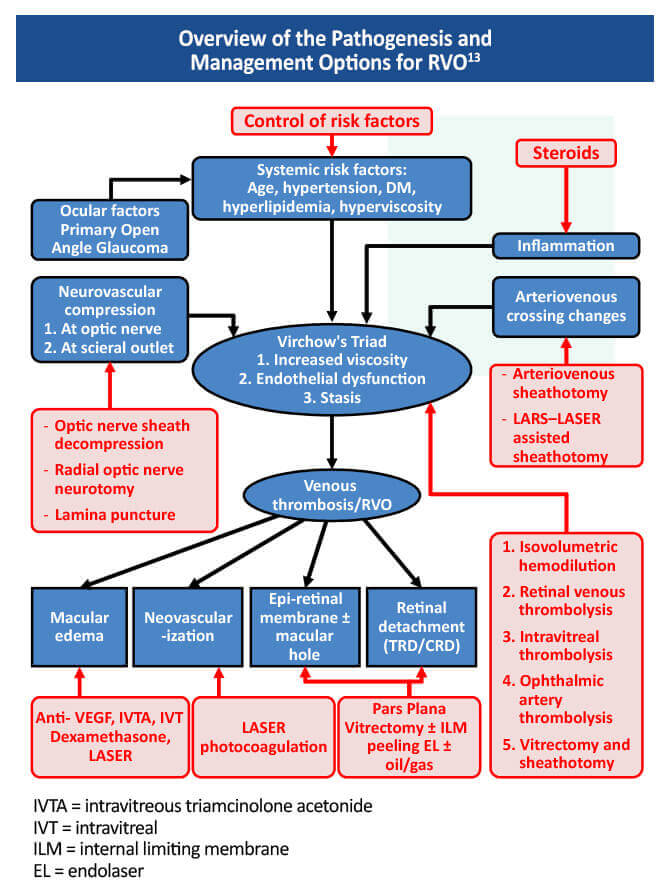RVO Management
Retinal vein occlusion (RVO) management for patients involves treating any complications due to the vein occlusion in addition to systemic disease etiology, such as hypertension, hyperlipidemia, and diabetes (known risk factors for RVO).1-3 A meta-analysis and systematic review suggest patients with any RVO have an increased risk of cardiovascular events and all-cause mortality.4,5 Therefore, as part of retinal vein occlusion management, the eye physician should refer patients with an RVO to their primary care provider (PCP) for appropriate management of their systemic condition(s). The eye physician should also communicate all eye examination results.4,6
Central retinal vein occlusion (CRVO)
The ischemic subtype of CRVO accounts for about 20% of cases and is associated with worse initial presenting visual acuity (VA) and poor visual prognosis even after edema resolution.7,8 The irreversible loss of VA in macular edema is usually attributed to permanent loss of photoceptor cells.9 In 2024, the American Academy of Ophthalmology (AAO) recommended intravitreal anti-VEGF vision loss therapy as first-line treatment for macular edema secondary to RVO, reserving corticosteroids as second-line treatment due to secondary glaucoma and cataract formation.3 Panretinal laser photocoagulation has also been recommended in the setting of neovascular complications secondary to RVO.4
A common first-line vision loss treatment protocol for patients with CRVO would include a loading dose of monthly injections over 3 months of an anti-VEGF inhibitor, such as ranibizumab, off-label bevacizumab, aflibercept 2 mg, faricimab, or biosimilar agents.3,8 Monthly treatment should continue until visual and anatomical outcomes are stable over 3 consecutive monthly assessments.10 For individuals who develop iris neovascularization or retinal neovascularization following development of CRVO, the best treatment is dense peripheral panretinal photocoagulation (PRP).4,11
Branch retinal vein occlusion (BRVO)
Branch retinal vein occlusion management (BRVO) depends on visual acuity, macular edema, and ischemic changes.1,12 Patients with a non-ischemic BRVO and VA of 20/40 or better should be monitored in 3-month intervals.10 Anti-VEGF injections should be initiated if VA is worse than 20/40 or if there is macular edema.10

References
- Jenkins T, Su D, Klufas M. RVO Overview. Retina Today. April 2018:40-58. https://retinatoday.com/articles/2018-apr/rvo-overview
- O’Mahoney PRA, Wong DT, Ray JG. Retinal vein occlusion and traditional risk factors for atherosclerosis. Arch Ophthalmol. 2008;126:692-699. https://jamanetwork.com/journals/jamaophthalmology/fullarticle/420485
- Kovach JL, Bailey ST, Kim SJ, et al. Retinal Vein Occlusions Preferred Practice Pattern®. Ophthalmology. 2025;132(4):P303-P343.
- Wills Eye Hospital. Central Retinal Vein Occlusion (CRVO). https://www.willseye.org/central-retinal-vein-occlusion-crvo/
- Guyatt GH, Oxman AD, Vist GE, et al. GRADE: An emerging consensus on rating quality of evidence and strength of recommendations. BMJ. 2008;336:924-926. https://www.bmj.com/content/336/7650/924
- O’Mahoney PR, Wong DT, Ray JG. Retinal vein occlusion and traditional risk factors for atherosclerosis. Arch Ophthalmol. 2008;126:692-699. https://jamanetwork.com/journals/jamaophthalmology/fullarticle/420485
- Hayreh SS, Podhajsky PA, Zimmerman MB. Natural history of visual outcome in central retinal vein occlusion. Ophthalmology. 2011;118:119-133.e2. https://pubmed.ncbi.nlm.nih.gov/20723991/
- Ashraf M, Souka A, Singh R. Central retinal vein occlusion: Modifying current treatment protocols. Eye (Lond). 2016;30:505-514. https://www.nature.com/articles/eye201610
- Lardenoye C, Probst K, Jaap K. Photoceptor function in eyes with macular edema. Invest Opthalmol Vis Sci. 2000,41:4048-4053. https://iovs.arvojournals.org/article.aspx?articleid=2162563
- Morris R, Retinal Vein Occlusion. Kerala J Ophthalmol. 2016;28:4-13. https://www.researchgate.net/publication/309963912_Retinal_vein_occlusion
- A randomized clinical trial of early panretinal photocoagulation for ischemic central vein occlusion. The Central Vein Occlusion Study Group N report. Ophthalmology. 1995;102:1434-1444. https://pubmed.ncbi.nlm.nih.gov/9097789/
- Stuart A. Untangling retinal vein occlusion. Eyenet Magazine. November 1, 2013. https://www.aao.org/eyenet/article/untangling-retinal-vein-occlusion
- Mishra D, Ramanjulu R, Shanmugam M. Retinal vein occlusion. eOphtha.com. http://www.eophtha.com/posts/retinal-vein-occlusion
All URLs accessed May 25, 2025










